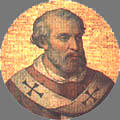 The death of John XII gave the Romans a chance to make peace
with Emperor Otto by accepting his pope, Leo VIII. But the Romans did nothing of
the kind. At once they elected the cardinal-deacon Benedict. Benedict was a
Roman, a notary from the region of Marcellus. He enjoyed a reputation for
learning. He had taken part in the council which had deposed John XII and
elected Leo VIII. Now, however, he repudiated Leo and accepted the election.
The death of John XII gave the Romans a chance to make peace
with Emperor Otto by accepting his pope, Leo VIII. But the Romans did nothing of
the kind. At once they elected the cardinal-deacon Benedict. Benedict was a
Roman, a notary from the region of Marcellus. He enjoyed a reputation for
learning. He had taken part in the council which had deposed John XII and
elected Leo VIII. Now, however, he repudiated Leo and accepted the election.
Though the Romans elected Benedict in defiance of the Emperor,
they did send an embassy to tell him about their proceedings. The embassy met
with a cold reception. Otto refused to hear of another pope. Leo was his pope
and he proclaimed that he would as soon give up his sword as give up Leo. These
words from a German warrior boded ill for Benedict. But Benedict, undaunted,
first made the Romans swear to support him, then calmly proceeded with his
consecration.
When Otto heard of this he was furious. And now, completely
victorious over Berenger, he had his hands free to attend to the Romans. Soon a
large imperial army stood before the walls of Rome and soon the Romans felt the
pinch of hunger. Benedict showed plenty of fight. He did not spare himself in
encouraging the Romans to fight on for liberty and the papacy. But though the
old walls resisted the battering of Otto's clumsy engines, famine entered the
city and compelled the Romans to surrender. All the fight seems to have oozed
out of Benedict. If Liutprand can be trusted, Benedict asked for pardon. Though
he was true pope, Benedict's position was weakened by the fact that he had taken
part in the election of his rival Leo VIII, a fact the imperialists were quick
to point out. They asked the unfortunate Benedict how he dared to have assumed
the pontifical robes while Leo yet lived. Benedict, according to Liutprand,
caved in. He admitted he had been wrong and agreed to his deposition. Otto
brought the deposed pope back to Germany and entrusted him to Adaldag,
archbishop of Hamburg. Adaldag seems to have treated the unfortunate Benedict
with kindness. Benedict edified all by bearing his misfortunes with patience.
This was not easy, for though Adaldag was considerate, other Germans regarded
Benedict as an insolent fellow who dared to defy their Emperor.
Benedict died a happy death on July 4, 965, at Hamburg. Some
years later his body was brought back to Rome.
Excerpted from "Popes
Through the Ages" by Joseph Brusher, S.J.

